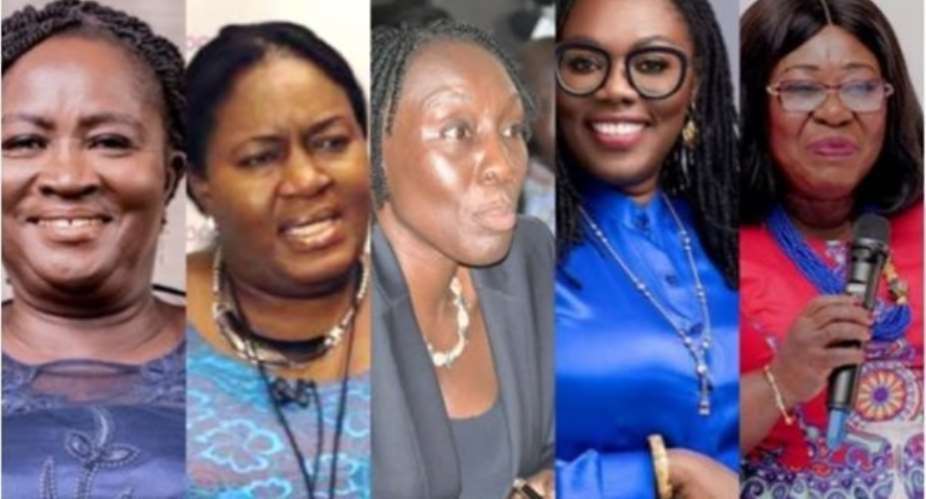The chosen flagbearers of Ghana's two major political parties have yet to select a running mate for the upcoming presidential and parliamentary elections. While many individuals feel that women should be allowed to join with elected flagbearers, others disagree. The National Democratic Congress (NDC) had a female running partner in the 2020 general election, and it is unclear if their flagbearer in this year's election would keep her. There are also calls for the New Patriotic Party (NPP) to pick a female running mate. However, some people believe Ghana is unprepared for a female running mate or President. Looking at women's roles in Ghana's previous and current parliaments, I wonder when Ghana would be ready for a female president. The women have proved their worth in Ghana's Fourth Republic and must be supported when given the opportunity.
Women comprise a modest proportion of Ghana's elected officeholders even though women account for more than half of the country's population. This deficiency may be attributed to prejudices and gender stereotypes that dissuade Ghanaian voters from supporting female candidates, the influence of party officials who recruit males while overlooking capable women, and women's lack of interest in running for political office. However, the few women who have served in Ghana's fourth republic have shown their ability to represent and lead their people. For example, the late Hawa Yakubu, often known as "The Iron Lady," Nana Konadu Agyemang Rawlings, and Mrs. Betty Mauld Iddresu are women who have made their mark in Ghana's politics. Others include Charlotte Osei, Marieta Brew Appiah-Oppong, Shirley Ayorkor Botchway, Valarie Esther Sawyer and Elizabeth Ofosu Agyare.
On the international level, we have women like Hon. Ellen Johnson Sirleaf, the first female President of Africa and Liberia, and Hon. Samia Suluhu Hassan, Tanzania's current President who have excelled in leading their countries. During Johnson Sirleaf’s 12-year administration, Liberia's per capita income rose from $80 to $700, life expectancy improved by eight years, and the country's population surged by over 50%. Hon. Samia Suluhu Hassan, the current Tanzanian President, received the Super Builder Award-Babacar N'Diaye Trophy for her contributions to the creation and execution of road, rail, and airport projects in Tanzania. These two female presidents and their leadership can be achieved equally by women politicians in Ghana when elected President. After all, what distinguishes these two female politicians from other countries that Ghanaian female politicians cannot do when allowed to govern the country?
Ghanaians must understand that when a woman assumes the highest position in the nation or supports an elected president, it promotes gender equality and improves responsiveness to citizens' concerns. It is also worth noting that having a female president or vice president would promote cross-party and ethnic collaboration and a more environmentally friendly future. Women are believed to be greater empathizers than males. This emotional sensitivity enables female leaders to encourage excellent open communication and mutual understanding among their teams. When a woman becomes a political leader, it will allow the country's leaders to put themselves in the shoes of the suffering people.
It is a fact that women in Ghana continuously display passion, energy, and a tremendous ability to serve and be served by others. Ghanaians must recognize that women make courageous and intelligent choices as leaders while depending on others to join their team. Their leadership fosters an atmosphere that is less totalitarian but more cooperative and family-like. Additionally, women are excellent leaders because they are natural multitaskers. Their capacity to react decisively and promptly to several tasks or situations simultaneously is essential to effective leadership, and Ghana requires this trait.
The nation needs effective communicators to communicate and transparent government policies to Ghanaians. Women are natural communicators, and very often regarded as one of a woman's most outstanding skills. For instance female leaders in certain business and public organizations are noted for speaking often, clearly, and freely with employers, coworkers, and partners. This is a quality that women possess when it comes to leadership. Finally, Ghanaians should notice how women manage crises better than their counterparts. For example, many women, particularly moms, are skilled caregivers who understand how to handle crises at home with compassion and patience. These characteristics become more critical when a female leader deals with a crisis scenario. Thus, Ghanaians must recognize women when choosing a running mate or presidential candidate for a political party in the nation.





 We saved $57.9million from procurement of new verification devices, registration...
We saved $57.9million from procurement of new verification devices, registration...
 Ejisu by-election: Aduomi is a betrayer – Ahiagbah
Ejisu by-election: Aduomi is a betrayer – Ahiagbah
 Dumsor: I’ll be in police custody if I speak, I vex — DKB
Dumsor: I’ll be in police custody if I speak, I vex — DKB
 We'll give daily evidence of Akufo-Addo's supervised thievery from our next gene...
We'll give daily evidence of Akufo-Addo's supervised thievery from our next gene...
 Asiedu Nketia crying because they've shared the positions and left him and his p...
Asiedu Nketia crying because they've shared the positions and left him and his p...
 Mahama's agenda in his next 4-year term will be 'loot and share' — Koku Anyidoho
Mahama's agenda in his next 4-year term will be 'loot and share' — Koku Anyidoho
 If you're president and you can't take care of your wife then you're not worth y...
If you're president and you can't take care of your wife then you're not worth y...
 Foreign Ministry caution Ghanaians against traveling to Northern Mali
Foreign Ministry caution Ghanaians against traveling to Northern Mali
 GHS warns public against misuse of naphthalene balls, it causes newborn jaundice
GHS warns public against misuse of naphthalene balls, it causes newborn jaundice
 Our education style contributes to unemployment - High Skies College President
Our education style contributes to unemployment - High Skies College President
